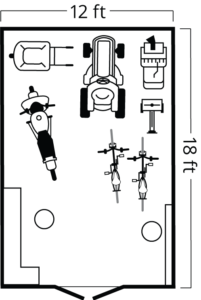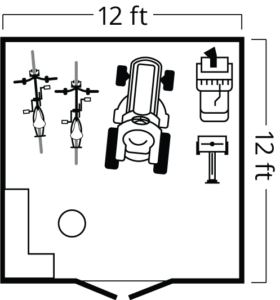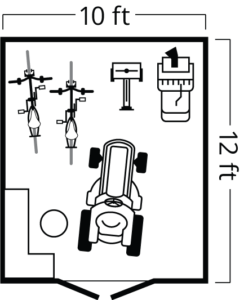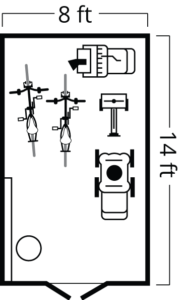When it comes to building a shed, whether it’s for storage, a hobby room, or a garden retreat, the foundation is as crucial as the structure itself. A solid and durable foundation for sheds not only ensures stability and longevity but also protects your investment from ground movement, moisture, and pests. At Pleasant Run Structures, we emphasize the importance of a robust foundation, understanding that the durability of any shed starts from the ground up.
The Importance of a Durable Foundation for Your Shed
A shed is only as stable as the foundation it rests upon. Here are a few reasons why investing in a durable foundation for sheds is essential:
1. Structural Integrity
A strong foundation prevents the structure from shifting and settling unevenly, which can lead to warped or cracked walls and uneven floors. This is particularly important in areas with extreme weather conditions or unstable soil.
2. Moisture Control
Proper foundations elevate the shed above the ground, reducing the risk of water damage from soil moisture and runoff. This is crucial for preventing rot and mold, which can compromise both the structure and contents of your shed.
3. Pest Prevention
By raising the shed off the ground, a solid foundation helps to deter pests such as termites and rodents, which can cause significant damage if they gain access to wooden components.
Types of Durable Foundations for Sheds
Choosing the right type of foundation is dependent on several factors, including the size of your shed, the type of soil, and your specific needs. Here are the most common types of foundations used for sheds:
1. Concrete Slab
A concrete slab is one of the most popular and durable foundations for sheds. It provides a flat and stable surface that’s perfect for almost any type of shed. Concrete is resistant to moisture, pests, and most chemicals, making it an excellent choice for workshops or storage areas that need to withstand heavy use.
2. Gravel and Block Foundation
For smaller sheds or those in temporary locations, a gravel and block foundation might be sufficient. This type of foundation involves laying a bed of gravel and then using solid concrete blocks to support the shed’s frame. It allows for good drainage and ventilation, reducing the risk of moisture buildup.
3. Pier Foundation
Pier foundations involve the use of concrete or wood posts (piers) that are placed at strategic points around the perimeter of the shed. This type of foundation is ideal for uneven terrain or for minimizing the impact on the landscape. It’s also suitable for larger sheds that require more complex support structures.
Custom Solutions for Your Needs
At Pleasant Run Structures, we understand that every shed project is unique. That’s why we offer customized foundation solutions tailored to meet the specific requirements of your project. Our experts can assess your site, discuss your needs, and recommend the most appropriate and durable foundation for your shed.
Building Beyond the Foundation
While the foundation is a critical component of shed durability, the overall design and construction of the shed also play significant roles. We pride ourselves on using high-quality materials and proven construction techniques to ensure that every shed we build is strong, functional, and aesthetically pleasing.
Ready to Build Your Perfect Shed?
Are you planning to add a shed to your property? Don’t underestimate the importance of a solid foundation. Visit us at Pleasant Run Structures to learn more about our durable foundations for sheds and other services. Our team is ready to help you design and build a shed that will serve your needs for years to come. Build right, from the ground up, with Pleasant Run Structures!









 Great For Yards
Great For Yards Great For Yards
Great For Yards Great For Yards
Great For Yards Great For Yards
Great For Yards

















